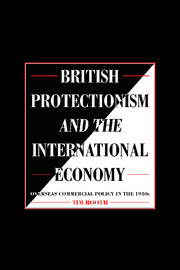Book contents
- Frontmatter
- Contents
- Preface
- List of Tables
- Introduction
- 1 Britain's international economic position in the 1920s
- 2 The political economy of protectionism
- 3 Imperial preference and the Ottawa Conference
- 4 The Scandinavian negotiations: formulation of policy
- 5 Completion of the first phase of negotiations: Scandinavia, Germany and Argentina
- 6 The world economic conference, Finland and Japanese competition
- 7 The Baltic states and Poland
- 8 British agricultural policy and imports during the 1930s
- 9 British exports to the trade agreement countries
- 10 Appeasing Germany and the United States
- 11 Some general conclusions
- Appendix A United Kingdom: payments, clearing etc., Agreements in force 1931–1938
- Appendix B Miscellaneous trade and payments agreements
- Appendix C Imports into Britain from foreign agreement countries
- Appendix D Total exports from Britain to foreign agreement countries and four dominions
- Appendix E Imports of selected commodities into UK, 1931, 1937, showing percentage from Empire sources
- Bibliography
- Index
8 - British agricultural policy and imports during the 1930s
Published online by Cambridge University Press: 06 July 2010
- Frontmatter
- Contents
- Preface
- List of Tables
- Introduction
- 1 Britain's international economic position in the 1920s
- 2 The political economy of protectionism
- 3 Imperial preference and the Ottawa Conference
- 4 The Scandinavian negotiations: formulation of policy
- 5 Completion of the first phase of negotiations: Scandinavia, Germany and Argentina
- 6 The world economic conference, Finland and Japanese competition
- 7 The Baltic states and Poland
- 8 British agricultural policy and imports during the 1930s
- 9 British exports to the trade agreement countries
- 10 Appeasing Germany and the United States
- 11 Some general conclusions
- Appendix A United Kingdom: payments, clearing etc., Agreements in force 1931–1938
- Appendix B Miscellaneous trade and payments agreements
- Appendix C Imports into Britain from foreign agreement countries
- Appendix D Total exports from Britain to foreign agreement countries and four dominions
- Appendix E Imports of selected commodities into UK, 1931, 1937, showing percentage from Empire sources
- Bibliography
- Index
Summary
This chapter examines the influence of British policy on imports from the trade agreement countries. By the 1920s, as discussed in chapter 3, the dominions had a larger share of the British market than before the war. But in the last four years before the depression the dominions began to lose ground to their Scandinavian, Baltic and Argentine competitors. The struggle for the British market was most intense in temperate foodstuffs, world imports of which were dominated by the UK, a domination which became even more marked as the depression worsened. Britain's return to protection signalled that a third major group of competitors, domestic farmers, were likely to have first call on their own home market. But although the Import Duties Act and the subsequent treaties had established a formal hierarchy between domestic, imperial and foreign suppliers, these were not absolute priorities but were highly qualified and contingent, and reflected the value placed by British policy makers on the maintenance of overseas markets, both dominion and foreign. One of the principal benefits of the treaties to Britain's suppliers was the way in which they constrained and shaped British agricultural policy in the 1930s.
Agricultural policy
By the summer of 1933 the major legislation and agreements had been completed. The Import Duties Act, the Ottawa conference legislation and the completion of the agreements with Denmark and Argentina had set the framework for British protection. This status quo, however, was soon under attack.
- Type
- Chapter
- Information
- British Protectionism and the International EconomyOverseas Commercial Policy in the 1930s, pp. 212 - 238Publisher: Cambridge University PressPrint publication year: 1993



